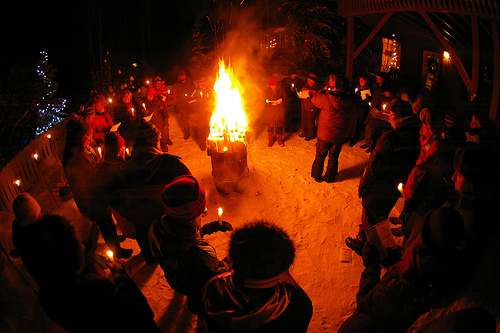
Secular Solstice: The New Winter Holiday for Humanists, Atheists, and Skeptics
- By Alison Lesley --
- 19 Dec 2014 --

The Non-Religious Holiday for Skeptics, Atheists and Humanists on the longest night of winter is celebrated as Winter Secular Solstice with lighting candles, singing songs.
Thanks go to Raymond Arnold, a 28-year-old humanist, for putting together the very first Secular Solstice. The festive celebration was a two hour long blending of music, singing and readings by candlelight held in New York last year. This year the event will be a multi-day affair in several cities.
The first Secular Solstice of this winter season was held December 13 at Humanist Hall in Oakland, CA, in a purple building with the insignia “the world is my country, to do good is my religion.” The crowd held hundreds of speakers, sharing their struggles of the past year with suicide and death, punctuated by singing together.
“When we sing together, we forget ourselves and find a sense of belonging,” Matthew Elder, the music coordinator for that night said. “The feeling of belonging is an intensely powerful thing to lean into that sense of belonging, so let’s sing together.”
“Just as there is no God to put a limit on suffering, there is no God to put a limit on the good that we can do,” said Alex Altair to the gathering before him on Saturday. The Secular Solstice project attracted over 150 people last year, and is spreading out to even more locations this year including San Francisco, Boston, LA and Oakland.
According to the Kickstarter campaign, which surpassed its goal by over $600, there is a primary mission to the holiday. “It starts with high energy and festivities, with bright lights that are gradually distinguished. When one candle remains in the darkness, a member of the community tells a story of the hardship behind us and the trials to come. We blow that candle out, sit together in the darkness for a moment, knowing that even if there’s no God to help us, we have each other.”
This celebration is similar to other atheist-humanist events, such as the Sunday Assembly in London that sparked through Canada, U.S., and Europe, or the HumanLight holiday. However, many other religions have done the same to mark the winter solstice as a holiday. Christians created Christmas from pagan winter holidays, while recent Reform Jewish rabbis have increased Hanukkah’s prominence against Christmas. Tickets can be purchased here.


















